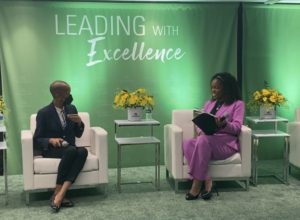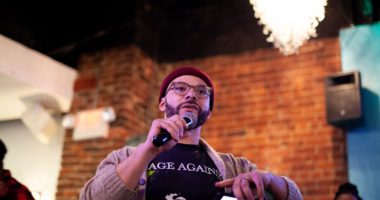Very Few Black Women Lead School Districts. These Superintendents Are Using the Power of Sisterhood to Change That
 During Teacher Appreciation Week, a group of Black women superintendents gathered at The Education Trust’s national headquarters in Washington, DC, to discuss the pressures they face in their work lives, the need to diversify the school leadership pipeline, and how to support each other while meeting students’ needs in the wake of the pandemic. Ed Trust and the School Superintendents Association (AASA) co-hosted the event, called “Black Women Superintendents Are Leading With Excellence,” which opened with a conversation between Dr. Angel Miles Nash, researcher and Wallace Foundation program officer, and Denisa R. Superville, an assistant editor at Education Week, that highlighted research on the experiences of Black women superintendents and the need to increase the share of Black women in the educator pipeline and in the upper ranks.
During Teacher Appreciation Week, a group of Black women superintendents gathered at The Education Trust’s national headquarters in Washington, DC, to discuss the pressures they face in their work lives, the need to diversify the school leadership pipeline, and how to support each other while meeting students’ needs in the wake of the pandemic. Ed Trust and the School Superintendents Association (AASA) co-hosted the event, called “Black Women Superintendents Are Leading With Excellence,” which opened with a conversation between Dr. Angel Miles Nash, researcher and Wallace Foundation program officer, and Denisa R. Superville, an assistant editor at Education Week, that highlighted research on the experiences of Black women superintendents and the need to increase the share of Black women in the educator pipeline and in the upper ranks.
Living at the Intersection of Racism & Sexism
Nash noted the contrast in the percentages of Black women teachers (7.5%) and Black women superintendents (1.4%) and sounded the alarm about the stark mismatch between the shares of Black women leading school districts and students of color, who comprise more than 50% of the student body in many K-12 districts. And students of color need to see themselves in the school leaders and teachers they encounter daily — studies show that Black students who have a Black teacher for at least one year are far less likely to drop out of school and far more likely to take advanced courses in high school and go on to college.
Black women educators and leaders live at the intersection of racism and sexism, so they may be uniquely positioned to build trust with students of color, parents, families, and community members of underserved districts. Said Nash, “Research shows that Black women spend more time in the classroom and in the community than many of their peers.” And given the rising tensions, particularly around race and education, K-12 schools would benefit from having more Black women who won’t shy away from having honest conversations about race and inclusion. Nash also talked about the power of “femtorship” (i.e., female mentorship), as well as safe spaces — like this one — where Black women educators and leaders can come together, compare notes, and find professional community among peers from other districts.
The panel featured Dr. LaTonya M. Goffney, president-elect of the National Alliance of Black School Educators and the first Black woman to lead the Aldine Independent School District, in Texas; Dr. Melanie Kay-Wyatt, who was just named superintendent of Alexandria City Public Schools and is the first Black woman to permanently hold that post; and Dr. Sonja Brookins Santelises, formerly of Ed Trust and now in her seventh year as CEO of Baltimore City Public Schools — who said they check in with each other regularly and rely heavily on their small “sisterhood” of Black women superintendents for guidance and support, especially when the going gets tough.
Drawing Strength from Each Other
Santelises, for example, said she drew strength from her sister superintendents last year, after Larry Hogan, then governor of Maryland, criticized her and threatened to bring criminal charges after a report by the state’s inspector general revealed that some teachers and school administrators had altered thousands of high schoolers’ grades between 2016 and 2019. Santelises recalled sobbing on a flight to Florida, where she was going to meet a group of other Black women superintendents. “When I got off the plane at 11:45 at night, I thought everyone had gone to the hotel, but a group of Black women was there waiting for me. I think that’s symbolic of the sisterhood,” she said. “On my worst day, they provided my best therapy” and reassurance that “it’s going to be OK.”
Kay-Wyatt, who, after serving as interim for the last year, will step into the Alexandria superintendent role permanently on July 1, thanked her peers in the room for all their encouragement and support and credited Dr. LaTanya McDade, the superintendent of Prince William County Public Schools, in Virginia, for prepping her for her new role.
The panelists talked openly about their professional struggles — alluding to the challenges of meeting students’ social and emotional needs in the wake of the pandemic and amid recent book bans, declining reading scores, and a politically charged climate — and what motivates them to stay in the job, despite the negative racial and gender stereotypes and microaggressions that many of them have endured as Black women in roles largely held by White men.
Being Committed to the Work
Goffney noted that Black women are resilient and “have always had to do hard things,” but says she’s “excited about the opportunity to make a difference” and wouldn’t have it any other way. “I believe that Black women are called to do this work, especially during these tough times.”
Santelises said that, for her, this role feels like generational work. “In Baltimore, there’s a fixation on trauma right now, and, if we’re not careful, it could be debilitating and leave a generation without hope. Because if we allow a narrative that our kids in our communities are so broken that we can’t do anything for them until everything is perfect, then we are selling a generation down the river. They are dying from a lack of hope. … And that is why at year seven, I’m still here, because I refuse on my watch to allow the trauma to be all that people know about young people in Baltimore City or anyplace else.”
For Kay-Wyatt, it’s the chance to change or impact people’s lives — be they students, parents, colleagues, or community members — that keeps her coming back. And sometimes, it’s the little momen ts, like the time a sixth-grade girl pointed to her natural hairdo and told her mom, “My hair is just like hers!”
ts, like the time a sixth-grade girl pointed to her natural hairdo and told her mom, “My hair is just like hers!”
All the panelists and speakers, including Dr. Kyla Johnson-Trammell, who is superintendent of Oakland Unified School District and gave remarks via video, stressed the importance of paying it forward and expressed a deep commitment to nurturing new talent and empowering the next generation of Black women education leaders. “It’s important for all of us in these roles to take that notion of being a trailblazer seriously,” said Johnson-Trammel. “When you’re in the seat of power, it’s your responsibility to make sure that you provide access to others who will occupy the seat after you.”
In her remarks, Dr. Christina Grant, state superintendent of education for Washington, DC, seconded this sentiment and urged the women in the room to keep coming together and supporting one another. She noted that there’s a special sense of pride that comes from being a member of the 1.4%: “It feels like you can walk into a room and see your mentors and your best friend, the person you were on the phone crying with yesterday. We live in a group chat, we fiercely protect each other, and I would have stayed at the airport waiting for Sonja until 3 a.m.,” Grant said before adding: “You’re not going to get left behind if you are a Black woman doing this work.” But she wants to see more representation. “I just want us to convene and be 7% and then get to 30%,” she said.
For other coverage of the event, see the articles in Ed Week and Word in Black.




